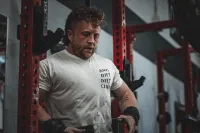Discover The Latest Blogs
Stay updated with Our Informative Blog Posts

The Myth of Toxic Masculinity & The Role of a True Father - Nat Galloway
The Myth of Toxic Masculinity & The Role of a True Father
Defining Masculinity: Strength, Responsibility, and Leadership
Masculinity has been misrepresented for years. Many think of aggression, dominance, or emotional repression as "masculine" traits, but true masculinity is the opposite. At its core, masculinity is about strength, responsibility, and leadership. It is the ability to protect, provide, and guide. The true masculine man is disciplined, resilient, and capable—he stands firm in the face of adversity and takes responsibility for himself and those under his care.
True masculinity is defined by:
Strength (physical, mental, and emotional resilience)
Responsibility (providing, protecting, leading)
Courage (facing adversity, standing up for others)
Integrity (keeping your word, standing by principles)
Leadership (guiding, protecting, setting an example)
Weakness, laziness, and lack of discipline are not masculine traits—they are the absence of masculinity.
Debunking Toxic Masculinity: Weakness Disguised as Strength
The term "toxic masculinity" has been thrown around so much that it has lost its meaning. The reality? There's no such thing as "toxic masculinity"—there’s just masculinity and weakness. Strength, responsibility, and self-reliance are not toxic; they are the foundation of being a capable man, father, and protector. True masculinity is about stepping up, not stepping back.
Weakness is avoiding responsibility, ignoring the need to be physically and mentally strong, and outsourcing protection to others. Weakness is failing to take ownership of your health and your family's security, expecting the government or society to fill the gaps. If you can't defend, provide, or lead, are you truly a father—or just a nanny dependent on the state?
The Role of a Father: Protection & Responsibility
A father’s duty is simple: protect, provide, and prepare. That means staying in the best shape possible, staying sharp, and being ready to act when needed. Whether it’s defending your family, handling emergencies, or simply setting an example for your children, your role is one of strength and leadership.
If your first instinct in a crisis is to call for help because you aren’t physically capable of handling the situation, you’ve surrendered your role as a protector. The police, the ambulance, or the government shouldn’t be the first line of defense—you should. Strength isn’t just about lifting weights; it’s about resilience, responsibility, and readiness.
Why This Shift Away From Masculinity?
The decline in masculinity is driven by comfort and complacency. When people rely on the state for healthcare, security, and stability, personal responsibility takes a back seat. In societies where government safety nets grow, people grow weaker—physically and mentally. They stop taking care of themselves, stop preparing for adversity, and instead rely on external systems for survival.
We see this behavior in many places, but a clear example is the UK and its relationship with alcohol. Because healthcare is free through the NHS, many people take no responsibility for their health. They drink excessively, knowing that if they develop liver disease or suffer alcohol poisoning, the government will foot the bill. The statistics back this up:
Alcohol-related deaths in the UK have risen from 7,551 in 2018 to 9,841 in 2022.
Over 87,000 people were treated for alcohol dependence by the NHS in 2022.
Alcohol consumption per capita has steadily increased, from 11.4 liters in 2018 to 12.4 liters in 2022.
This lack of personal responsibility extends beyond health. When fathers don’t take ownership of their role as protectors, they defer to external authorities. If an emergency happens—say, a fire or a home invasion—they assume that calling the police or ambulance is enough. But what if help doesn’t arrive in time? If your child is trapped, but you're too weak to move an object or enter the fire, that failure is on you. The state won’t save you. No one is coming.
The same applies to basic life-saving skills. If you have children and don’t know CPR, you’ve failed them. Ambulances won’t arrive fast enough in a critical moment—it’s on you to step up and take action. But many people don’t bother because they assume someone else will do it for them. That’s the core issue: laziness, complacency, and reliance on others.
Every Second Counts: Are You Ready?
We see situations like this all the time. Videos on social media show parents losing control of a stroller and having to sprint after it. Kids falling onto train tracks, and their parents being too weak or slow to lift them in time. If you truly love your children, you should be training to be ready for these moments. Your reaction time, your speed, and your strength in these split seconds can be the difference between survival and disaster.
The same goes for your own health. If you love your family and want to protect them, why are you not doing more to look after yourself? If you could live even one more day to protect your child, wouldn’t you take that chance? Or are you going to stand there and blame the healthcare system for your own failings?
If you could make yourself just one second faster, one step stronger, to increase your chance of saving your child, wouldn’t you do it?
Final Thought: Choose Strength
If you’re a father, your family looks to you for protection and stability. Masculinity isn’t toxic; it’s necessary. Weakness, on the other hand, is what breeds dependency, insecurity, and failure. The world doesn’t need fewer strong men; it needs more of them. Be the example. Take ownership of your health, your responsibilities, and your ability to stand firm when it matters most.
If you’re ready to take ownership of your health, your strength, and your role as a father and protector, we’re here to help. Book a free call with me or one of our coaches at www.masterathletic.com.
We’ll discuss where you are and where you want to be and how to build the strength, discipline, and resilience your family needs from you. Your first step starts here.
Nat Galloway
Coach, Master Athletic Performance




